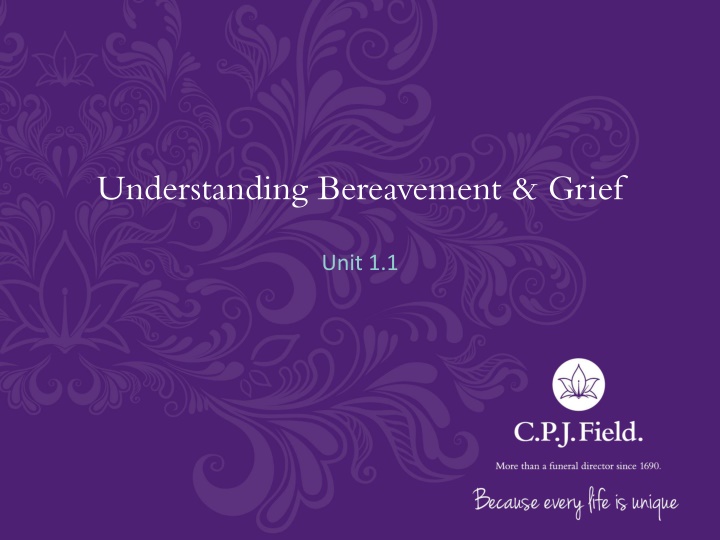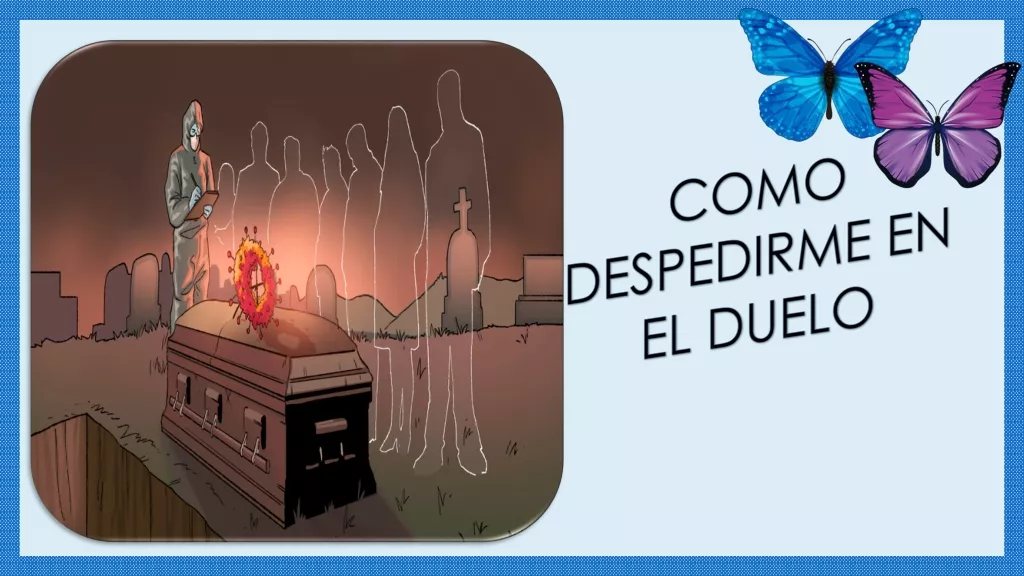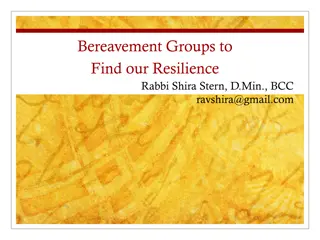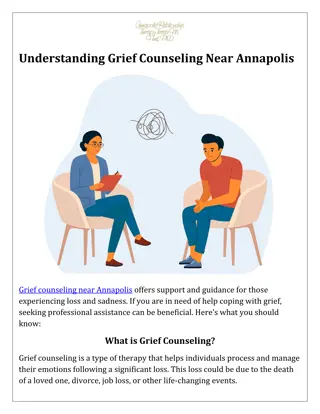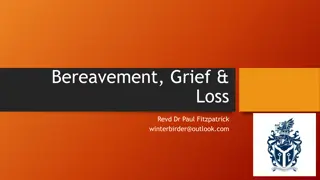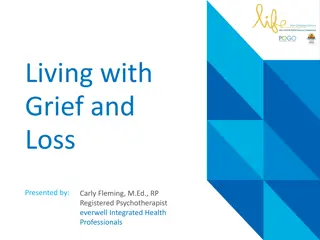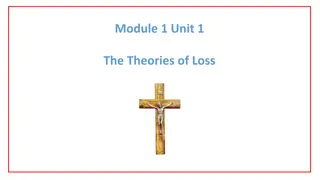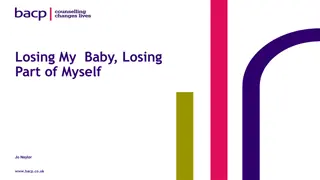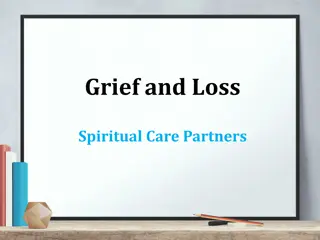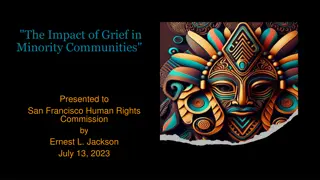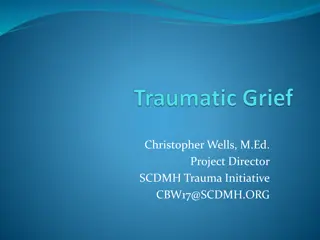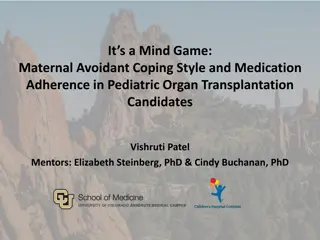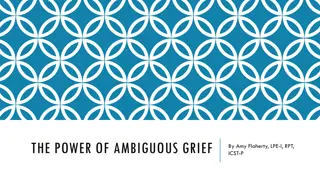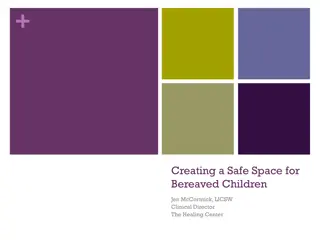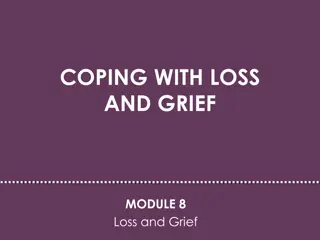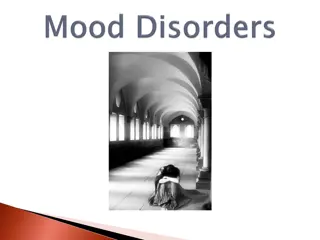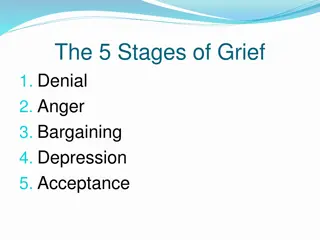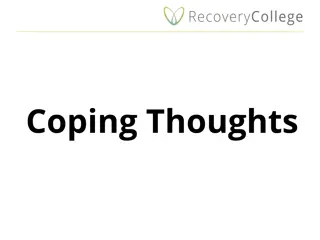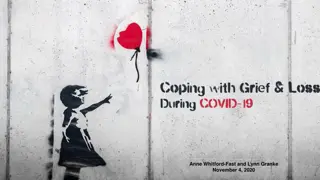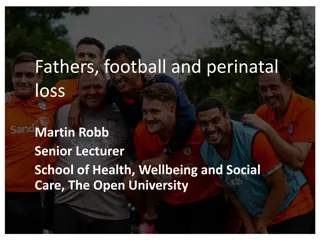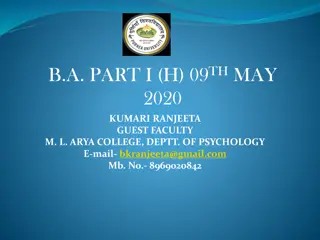Coping with Grief: Understanding Loss
The impact of different circumstances of death on grief, discuss theories of loss, and understand how faith, culture, and funeral services affect the grieving process. Delve into determinants of grief, types of grief, and theories regarding why we grieve. Dive into John Bowlby's Attachment Theory and the concept of the Assumptive World in dealing with bereavement.
Download Presentation

Please find below an Image/Link to download the presentation.
The content on the website is provided AS IS for your information and personal use only. It may not be sold, licensed, or shared on other websites without obtaining consent from the author.If you encounter any issues during the download, it is possible that the publisher has removed the file from their server.
You are allowed to download the files provided on this website for personal or commercial use, subject to the condition that they are used lawfully. All files are the property of their respective owners.
The content on the website is provided AS IS for your information and personal use only. It may not be sold, licensed, or shared on other websites without obtaining consent from the author.
E N D
Presentation Transcript
Understanding Bereavement & Grief Unit 1.1
Aims and Objectives Understand how circumstances of death might affect grief Consider theories on the cycle of grief Discuss theories of loss (why do we grieve at all?) Understand how faith and culture affects grief Consider the role of the funeral service
Grief is the price we pay for love. H.M. Queen Elizabeth II, 20.9 .2001
Determinants of Grief Who the deceased person was The nature of the relationship of the bereaved and deceased people Previous history of bereavement The bereaved person s social network The bereaved person s faith position Manner of death
Some others that come up Emotional / intellectual capacity Geographical proximity Dependence on deceased Motivation
Types of grief anticipatory grief Where it is known that a death will occur Grief Where death has occurred unresolved grief Further bereavement occurs before one has been processed complicated/traumatic/abnormal grief Which can take various forms
Be clear on the difference Theories of loss Models of grief The form our grief takes Why we grieve at all
Who said this? In this world nothing can be said to be certain, except death and taxes. Benjamin Franklin
John Bowlbys Attachment Theory When separation occurs three things follow: 1. Protest This is not happening. 2. Despair Okay, this is happening. 3. Detachment So it happened.
The Assumptive World Things are the way we expect them to be This enables us to plan for things Death, even when expected, can overturn these assumptions A new world of assumptions will in time be created Dr Colin Murray-Parkes
Structures of Meaning No one likes change Order provides control We understand the world as it is and our place in it We apply our own understanding to things as they relate to us Death undermines that structure Peter Marris
And now: And now: Models of grief Remember: this is how we grieve, and is different to why
Bereavement Models: Kbler-Ross 5 Stages Denial Anger Bargaining Depression Acceptance
Islam Sikh Judaism Christianity Bah Zoroastrianism Falun Gong Hinduism Buddhism Rastafarian Humanist Scientology Shinto
Threefold function Separation Transition Incorporation & reintegration
Function of the funeral Psychological It allows emotion to be expressed, assisting mourning Sociological Providing a forum for shared experience Religious and Spiritual Meeting the requirements of faith for deceased and bereaved Philosophical The bereaved and the wider community can reflect on life and death
Dr Alan Wolfelt: Purpose of the funeral Reality Funerals help us begin to truly acknowledge the reality that someone in our life has died. Recall Funerals encourage us to remember the person who died and share our unique memories with others, creating hope for the future. Support Funerals bring together people who care about each other in an atmosphere of love and support. Expression Funerals allow us to express our inner thoughts and feelings about the life and the death. Meaning Funerals mark the significance of the life that was lived. They also help us find meaning and purpose in our continued living, even in the face of loss. Transcendence Ultimately, funerals help us embrace the wonder of life and death.
